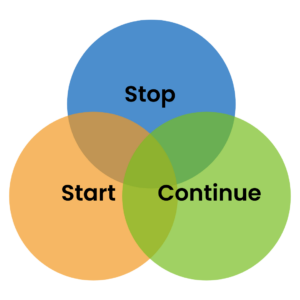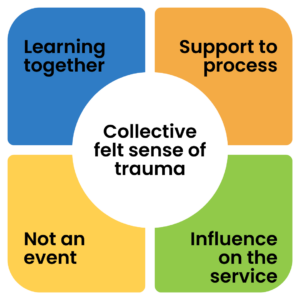-
The journey of a thousand miles begins with one step
The NHS West Midlands Gambling Harms Clinic provides specialist psychological therapies, treatment, and recovery to individuals harmed by gambling. Andy Ryan, Project Manager for the service shares the start of their journey in becoming more trauma-informed to enhance the service further.
At a recent team meeting for the Gambling Harms Clinic, we focused on adopting a trauma-informed approach to service delivery. This discussion was part of a larger initiative within Inclusion (and the wider Trust) to explore what it means to us within the service and also to consider the steps we need to take to adopt a more trauma aware process around the ways in which we support people.
The shared experiences around the table provided us with a deep understanding of how trauma affects not only personal lives but also the environments and systems in which we operate. However, we faced a challenge: where to begin? Trauma can often seem overwhelming, and this feeling can extend to our roles as well. The sheer volume of tasks and the various ways we believe we can improve our relational and trauma-aware services may sometimes leave us feeling stuck, hindering progress.
 With this awareness in mind, and to prevent stagnation during our discussion, we opted for a practical approach. We decided to explore the five ‘Rs’ outlined in Inclusion’s trauma-informed guidance in small groups. Following these discussions, we would reconvene as a team to develop, reflect, and provide suggestions in three primary areas of focus:
With this awareness in mind, and to prevent stagnation during our discussion, we opted for a practical approach. We decided to explore the five ‘Rs’ outlined in Inclusion’s trauma-informed guidance in small groups. Following these discussions, we would reconvene as a team to develop, reflect, and provide suggestions in three primary areas of focus:
-
Developing a trauma informed practice culture requires us to be aware of ourselves, the people we support and the space between. This requires us as individuals, a team and organisation to be malleable and open for development whilst standing on the solid ground of experience, practice, regulations, guidance and the bigger frameworks we deliver within.
The three core areas are:
-
1. What would we stop?
Thinking about the 5 ‘Rs’ and the support we offer, what would we like to work towards changing or even plan to stop doing that may contribute to the service not being sensitive to the people we support and the team that deliver this
-
What would we start?
Using the 5 ’Rs’ as a guide to reflect, what would we start doing to improve the service when thinking about how trauma is felt for the people we support and the team.
-
What would we continue?
Reflecting on the 5 ‘Rs’ we take time to celebrate what are we doing well and despite any pressures we would like to always continue to do as we think it is intrinsic in the service culture of being trauma aware.
There were several important areas of reflection during this team exercise, but one discussion we would like to highlight focused on the felt sense of trauma.

While we continuously aim to understand the traumatic effects of gambling on individuals, communities and regions, each team member brings their own unique history, which includes varying degrees of traumatic experiences that deserve our attention. As our entire team interacts with individuals seeking support, we find ourselves in the privileged position of being trusted by people sharing their experiences with us. From this discussion, several key themes emerged that we want to prioritise as we enhance our trauma awareness as a team moving forward.